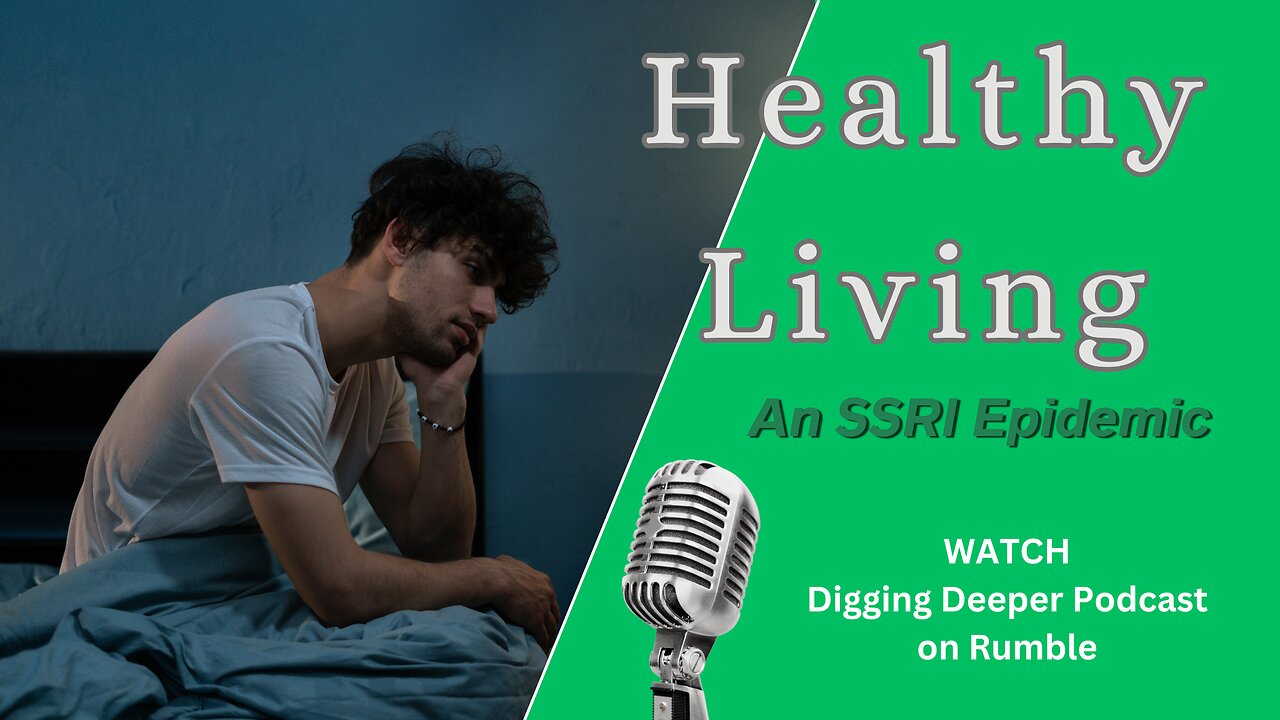Premium Only Content

Healthy Living; An SSRI Epidemic
What are SSRI’s
Antidepressants work by changing the balance of certain neurotransmitters in your brain, but which ones they affect and how they affect them varies from one antidepressant to another — and there are many different classes of antidepressants.
Selective serotonin reuptake inhibitors, or SSRIs, are indeed the most common type of antidepressant prescribed in the United States, and they have been ranked number one for several decades.
Serotonin regulates certain aspects of your mood, including feelings of happiness, and SSRIs increase the amount of serotonin in your brain by blocking your brain cells from reabsorbing (or reuptaking) existing serotonin. Most of the time, SSRIs produce a noticeable improvement in people affected by depression within about two to four weeks.
Currently, several different SSRI antidepressants are used to treat depression, anxiety disorders and other conditions. They include:
Citalopram (Celexa®)
Escitalopram (Lexapro®)
Fluoxetine (Prozac®)
Fluvoxamine (Luvox®)
Paroxetine (Paxil®)
Sertraline (Zoloft®)
Vilazodone (Viibryd®)
Vortioxetine (Trintellix®)
SSRI Side Effects
Gastrointestinal Issues
Insomnia
Weight Changes
Dry Mouth
Dizziness, Tremors and Headaches
Nervousness, Restlessness and Agitation
Sexual Side Effects
Sexual dysfunction is a common side effect among SSRIs. Women may experience sexual side effects such as difficulty experiencing an orgasm and decreased sex drive. These side effects can affect both men and women. For men, adverse effects can be having difficulty experiencing orgasm, erectile dysfunction and decreased sex drive. Between 40 and 65 percent of people who take an SSRI experience some form of sexual dysfunction, according to a review of studies published in the journal The Mental Health Clinician.
SSRI’s and Gender Dysphoria
Anti depressants (SSRI’s) can potentially have nasty side effects long after stopping them. One of these is PSSD Post SSRI sexual dysfunction This can cause Total loss of libido Genital numbness Emotional blunting For years or decades You think people are told this prior?
For many users of antidepressants, the sexual side-effects are the reason they eventually discontinue the drug, with or without medical supervision.
When patients bring our concerns about sexual functioning while on antidepressants to our health care providers, they are almost universally told that their sexuality will return to normal after tapering off the drug. Unfortunately, recent data has emerged showing that this is not always true. Some people continue to experience sexual dysfunction for weeks, months, or years after stopping the medication. Sometimes, these symptoms emerge only after tapering off the medication.
For an unfortunate minority, a total elimination of sexual drive persists indefinitely. They may have severe or total loss of erotic sensation in our genitals, sometimes to the point of tactile numbness.
The effects of losing my sexuality have been absolutely devastating to my relationships and mental health. I have been robbed of an essential aspect of my humanity.
EMILY, AGE 24, PSSD 2 YEARS
A growing movement of people across the globe are trying to raise awareness about a seldom discussed topic: youth sexual dysfunction and its ties to these popular medications. Sexual issues such as low libido and erectile dysfunction are not unusual for those over the age of 40, but many young people may not know that they could possibly run into these physical health issues if they are prescribed meds to treat mental health issues.
The brain chemical mechanism that many of these drugs use to prevent low emotions may also have the side effect of killing the joy of not just sexual relations, but also of human experience joys such as music and artwork.
In addition to the loss of libido and sexual sensation (numbness of genitalia and other erogenous zones), my general sensitivity to the pleasure of touch has declined. A caress on bare skin registers as little more than pressure…. There is a feeling of numbness, as if there is some kind of barrier between my skin and the source of contact.
ELLEN, AGE 48, PSSD FOR 14 YEARS
-
 31:38
31:38
Digging Deeper Original Podcasts
3 months agoThe Ugly Truth; No More Diddy Parties
2.59K -
 LIVE
LIVE
LFA TV
14 hours agoLFA TV ALL DAY STREAM - MONDAY 6/2/25
5,473 watching -
 LIVE
LIVE
Caleb Hammer
1 hour agoHe Exploited Pr*stitutes, Now He's F*cked | Financial Audit
82 watching -
 LIVE
LIVE
The Big Mig™
2 hours ago‘Drones of Doom’ Did Ukraine Just Trigger WWIII with Russia?
4,994 watching -
 1:09:00
1:09:00
Dear America
3 hours agoIs Pride Month DEAD?! + Ukraine/Russia Apparently Want War!
104K174 -
 2:09:54
2:09:54
Matt Kohrs
13 hours agoTrade Tensions Rise, Powell Speech & Breaking Market News || The MK Show
41.8K2 -
 LIVE
LIVE
Badlands Media
10 hours agoBadlands Daily: June 2, 2025
5,720 watching -
 LIVE
LIVE
Wendy Bell Radio
6 hours agoHighway To Hell
4,512 watching -
 52:57
52:57
NEWSMAX
2 hours agoThe Fight Against Sanctuary Policies | The Gerry Callahan Show (06/02/2025) | NEWSMAX Podcasts
10.1K -
 LIVE
LIVE
Discover Crypto
2 hours ago🚨ETHEREUM TO $3,000 THIS WEEK!? (Fed Powell Speaks TODAY)
57 watching